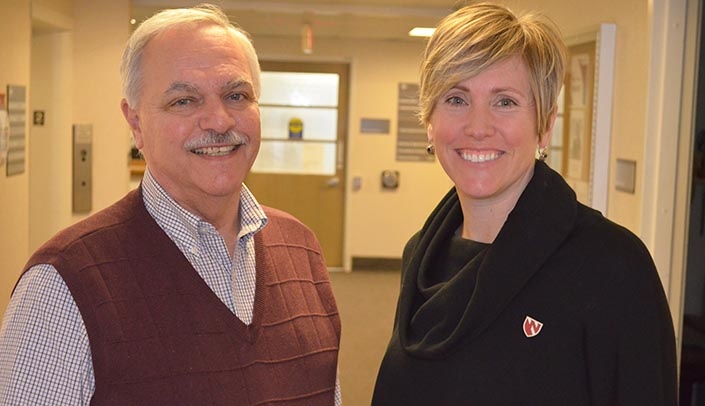Forty-nine cities and towns.
That’s the goal for Joe Evans, Ph.D., and Brandy Clarke, Ph.D., psychology faculty members at the Munroe-Meyer Institute and at the Behavioral Health Education Center of Nebraska (BHECN). The pair are working to recruit, train and place a behavioral health provider in all 49 municipalities in Nebraska with a population of at least 2,500.
The task may get easier with the help of a four-year, $1.9 million grant from the Behavioral Health Workforce Division of the Health Resources and Services Administration (HRSA), designed to address underserved populations in both rural or inner city communities.
“Each year our Behavioral Health Workforce Education and Training Grant will fund seven psychology interns, four psychiatric nurse practitioner students and five master’s level behavioral health interns,” said Dr. Evans, who recently was awarded the University of Nebraska IDEA Award for his outreach efforts. “The grant requires these practitioners to receive supervised clinical training that is integrated into primary care medical practices.”
There are more than 2,500 licensed psychiatrists, psychologists, social workers, psychiatric nurse practitioners, counselors, and medical family therapists in Nebraska, but only 26 percent of them practice in rural areas.
Since 1997, Dr. Evans and the MMI Department of Psychology have started or supported the integration of behavioral health providers into 42 primary care clinics, 24 in rural Nebraska and 18 in the Omaha or Lincoln areas. The new grant will allow Drs. Evans and Clarke to reach out to more underserved communities.
“With this grant, we’re funding interns in the last year of their training program for their clinical internship year,” Dr. Clarke said. “We will try to facilitate more placements in integrated primary care settings from the multiple disciplines of behavioral health professionals.
“When looking for interns, we make it known that we’re looking for folks with an interest or an investment in rural areas,” she said. In their final year of clinical training, she added, students also receive training on business models, operations, and other skills that will allow them to start new clinics in additional underserved communities.
Drs. Evans and Clarke set the target population at 2,500 because these communities usually have a regional hospital that serves many surrounding towns.
“That way, people only have to travel between 15-40 miles to get their behavioral health care, because they’re getting their health care services there anyway. Plus, any stigma involving seeing a behavioral professional is reduced,” Dr. Evans said.
The secondary goal of the grant is to replicate the MMI program to other states. Universities in Michigan, Florida and Pennsylvania are replicating the MMI training model. Other program graduates are providing integrated behavioral health care in Delaware, Mississippi, Oregon, and Tennessee, but the primary target for the grant is to increase Nebraska’s behavioral health workforce.

WONDERFUL, and so very much needed!!
Wow!! Congratulations…no better time for this…what an outstanding contribution to our state's wellness…Good Job you two !!
Nice article! I love it that integrated behavioral health makes it "safe" to access mental health care in our rural communities..the neighbors see one's car in front of the doctor's office, not the "shrink's" office.